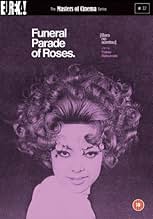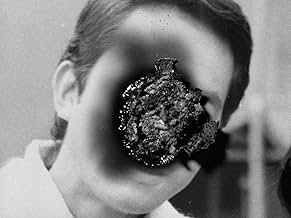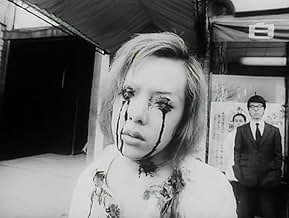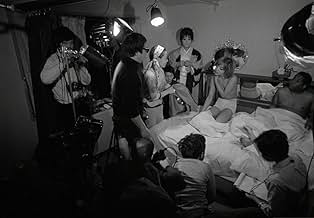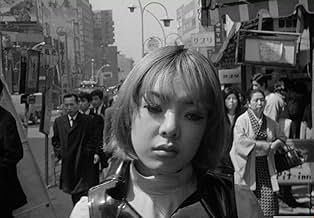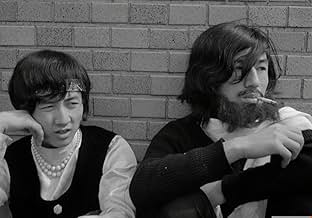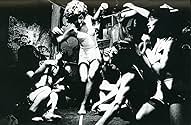IMDb RATING
7.7/10
8.2K
YOUR RATING
The trials and tribulations of Eddie and other transvestites in Japan.The trials and tribulations of Eddie and other transvestites in Japan.The trials and tribulations of Eddie and other transvestites in Japan.
- Director
- Writer
- All cast & crew
- Production, box office & more at IMDbPro
7.78.1K
1
2
3
4
5
6
7
8
9
10
Featured reviews
Funeral Parade of Roses
An unsettling and astonishing Japanese film that introduced me to the Japanese New Wave movement.
"Funeral Parade of Roses," like many of the best works of art, defies description or categorization. It dives into the Japanese gay sub-culture of the 1960s, and specifically young gay men who dress and act like women. It blurs the line between fact and fiction; at times, the actors in the movie become actors in a movie within the movie, and the movie itself becomes a documentary about the making of a movie about gay Japanese youths. If you can follow that sentence, then you're on the way to having the right sensibility to enjoy this film.
It's a shocking movie too, going places most other films at the time, and certainly few American movies, would dare. The only big American movie I can think of from that time period that comes even close to tackling subjects that general audiences would find equally unsavory is "Midnight Cowboy," and this film makes that one look like a Doris Day romp in comparison.
Grade: A
"Funeral Parade of Roses," like many of the best works of art, defies description or categorization. It dives into the Japanese gay sub-culture of the 1960s, and specifically young gay men who dress and act like women. It blurs the line between fact and fiction; at times, the actors in the movie become actors in a movie within the movie, and the movie itself becomes a documentary about the making of a movie about gay Japanese youths. If you can follow that sentence, then you're on the way to having the right sensibility to enjoy this film.
It's a shocking movie too, going places most other films at the time, and certainly few American movies, would dare. The only big American movie I can think of from that time period that comes even close to tackling subjects that general audiences would find equally unsavory is "Midnight Cowboy," and this film makes that one look like a Doris Day romp in comparison.
Grade: A
Uncompromising, unapologetic cinema
In a key moment around the half-way mark in Toshio Matsumoto's Funeral Parade of Roses, the young protagonist Eddie, a transsexual working in Tokyo, stabs his mother's lover and then his mother himself. Matsumoto's film is full of Oedipal subtexts, but here Eddie kills his mother to (perhaps) get to his father, so it is the reverse of the Oedipus story. In fact, most of the film is 'backwards' in the traditional sense, full of narrative tricks, contrasting styles and shifts in tone, moving from melodrama to documentary to horror with each scene.
Eddie (played by real-life queen Pita) is a drag-queen working at a top Tokyo underground club ran by Gonda (Yoshio Tsuchiya). Eddie is the top attraction at the club, much to the envy of ageing madam Leda (Osamu Ogasawara). When Gonda starts a secret affair with Eddie, Leda finds out and plans to hurt and disfigure Eddie in her jealousy. Running alongside this fictional storyline are various interviews with the real-life queens who act in the film, who offer insights about life in Tokyo for queens and how the film will represent them.
There was a huge boom in Japan in the 1960's of films now known as Japanese New Wave. Funeral Parade of Roses is certainly one of the most daring and technically innovative, stripping back genre (and even cinematic) conventions to create one of the most important films in the history of Gay Cinema. This leads to an occasionally confusing and head- spinning film, that can switch quickly from a generic love scene to a moment of avant-garde (an argument between two queens have them shouting at each other with speech bubbles) to a bloody set-piece. One of the most inspirational films to come out of Japan, this was a favourite of Stanley Kubrick's, and no doubt the scenes that are played out in fast- forward were an influence on A Clockwork Orange (1971). Uncompromising, unapologetic cinema.
www.the-wrath-of-blog.blogspot.com
Eddie (played by real-life queen Pita) is a drag-queen working at a top Tokyo underground club ran by Gonda (Yoshio Tsuchiya). Eddie is the top attraction at the club, much to the envy of ageing madam Leda (Osamu Ogasawara). When Gonda starts a secret affair with Eddie, Leda finds out and plans to hurt and disfigure Eddie in her jealousy. Running alongside this fictional storyline are various interviews with the real-life queens who act in the film, who offer insights about life in Tokyo for queens and how the film will represent them.
There was a huge boom in Japan in the 1960's of films now known as Japanese New Wave. Funeral Parade of Roses is certainly one of the most daring and technically innovative, stripping back genre (and even cinematic) conventions to create one of the most important films in the history of Gay Cinema. This leads to an occasionally confusing and head- spinning film, that can switch quickly from a generic love scene to a moment of avant-garde (an argument between two queens have them shouting at each other with speech bubbles) to a bloody set-piece. One of the most inspirational films to come out of Japan, this was a favourite of Stanley Kubrick's, and no doubt the scenes that are played out in fast- forward were an influence on A Clockwork Orange (1971). Uncompromising, unapologetic cinema.
www.the-wrath-of-blog.blogspot.com
clean? :-) fun
If you really are looking for a good time in a movie theatre - watch this movie ! It has been said that some of Kubrick's visual and sonic ideas for "Clockwork Orange" were inspired by this movie; after having seen it, i'm more than convinced that this is true.
This movie offers a lot of cinematic ideas and it uses surprising ways to make a point within a story.
What is the reason that films with a spirit and mood like that have vanished from the screen ? Have the politics in the movie industry really become so strict ? This movie watched nowadays has (but maybe had always) a subversive feel to it, why is that ?
It definitely offers something different and therefore would be very welcome in movie theatres and videostores around the world to free us from all the uninspired formula movies.
This movie offers a lot of cinematic ideas and it uses surprising ways to make a point within a story.
What is the reason that films with a spirit and mood like that have vanished from the screen ? Have the politics in the movie industry really become so strict ? This movie watched nowadays has (but maybe had always) a subversive feel to it, why is that ?
It definitely offers something different and therefore would be very welcome in movie theatres and videostores around the world to free us from all the uninspired formula movies.
Odd, interesting Japanese avant-garde film
I am not a fan of avent-garde films, which I find are often pretentious and silly, but I enjoyed "Funeral Parade of Roses", primarily because I found the main character "Eddie" (played by Shinnosuke Ikehata aka "Peter") fascinating. The film is a non-linear composite of drama and documentary like vérité punctuated by abstract inclusions (jump cuts to stills, substitution splices, etc), some of which are more effective than others. Supposedly, Kubrick drew inspiration for "A Clockwork Orange" (1971) from this film and there are certainly some similarities (at one point Eddie looks straight at the camera through up cast eyes in a scene that reminded me of the iconic opening shot of "Alex" in Kubrick's film). Lacking much of a plot, "Funeral Parade of Roses" primarily peers into Tokyo's gay scene and follows Eddie, a transvestite 'bar girl' as he moves amoungst his friends (including pretentious auteur 'Guevara') in hopes of luring boss Gonda (Yoshio Tsuchiya) from rival, and bar 'Madame', Leda (Osamu Ogasawara), perhaps becoming 'Madame' himself. The black-and white cinematography is lovely, the characters intriguing and photogenic and the direction, for the most part, excellent (the interminable toking scene not withstanding). While the film is nonlinear, there is a traditional 'climactic' sequence at the end that is well worth waiting for and explains many of the references to the film being an Oedipal myth. Not to everybody's tastes but well worth trying out.
The search for love, identity and place in a Tokyo bar is a one of the great "unknown" films of cinema
Eddie is a transvestite hostess at one of Tokyo's clubs. He/she spends her time working, being in the films of a friend, taking drugs and trying to find love.
Said to be one of Stanley Kubrick's favorite films and a big influence on Clockwork Orange this is probably one of the best films most people have never seen. Released in 1969 this film is as fresh and shattering as it must have been back when it was made. Set in a "Gay" world this is actually a movie about people and how they act and feel, the fact that they are gay is irrelevant. These are real people in a real world that seems to be happening now instead of when it was made (due no doubt to the stunning black and white photography). The film uses just about every 1960 "art film" technique you can think of and does so better than any film in from Europe ever did (Buñuel, and Bergman should have been this successful). Interviews of the cast, sudden juxtaposition of scenes, shifts in tone and style, sudden bursts of violence, all blend together to tell a story of a search for identity and place that is in its way universal, even if its outcome is not.
This is a movie that is simple to explain, but difficult to sum up. The effect of it being somewhat greater than the simplicity of the storyline.
See this movie. This is one of those movies that movie lovers should search out.
9 out of 10 (Because to be honest I'm not sure if I'm more in love with the technique or the film itself- though either way its a great film)
Said to be one of Stanley Kubrick's favorite films and a big influence on Clockwork Orange this is probably one of the best films most people have never seen. Released in 1969 this film is as fresh and shattering as it must have been back when it was made. Set in a "Gay" world this is actually a movie about people and how they act and feel, the fact that they are gay is irrelevant. These are real people in a real world that seems to be happening now instead of when it was made (due no doubt to the stunning black and white photography). The film uses just about every 1960 "art film" technique you can think of and does so better than any film in from Europe ever did (Buñuel, and Bergman should have been this successful). Interviews of the cast, sudden juxtaposition of scenes, shifts in tone and style, sudden bursts of violence, all blend together to tell a story of a search for identity and place that is in its way universal, even if its outcome is not.
This is a movie that is simple to explain, but difficult to sum up. The effect of it being somewhat greater than the simplicity of the storyline.
See this movie. This is one of those movies that movie lovers should search out.
9 out of 10 (Because to be honest I'm not sure if I'm more in love with the technique or the film itself- though either way its a great film)
Did you know
- TriviaFuneral Parade of Roses (1969) gave Stanley Kubrick several visual and aural inspirations for his adaptation of A Clockwork Orange (1971).
- GoofsAll entries contain spoilers
- ConnectionsEdited from Ecstasis (1969)
- SoundtracksO du lieber Augustin
- How long is Funeral Parade of Roses?Powered by Alexa
Details
- Release date
- Country of origin
- Languages
- Also known as
- Funeral Procession of Roses
- Filming locations
- Production companies
- See more company credits at IMDbPro
Box office
- Gross worldwide
- $1,114
- Runtime
- 1h 45m(105 min)
- Color
- Sound mix
- Aspect ratio
- 1.37 : 1
Contribute to this page
Suggest an edit or add missing content



